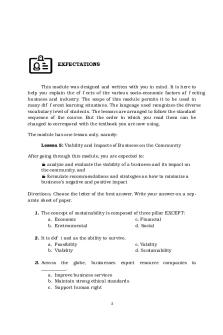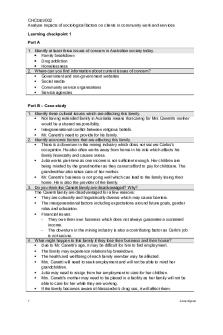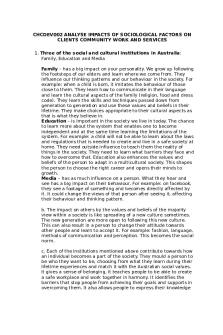CHCDEV002 Analyse impacts of sociological factors on clients in community work and services - Final Assessment PDF

| Title | CHCDEV002 Analyse impacts of sociological factors on clients in community work and services - Final Assessment |
|---|---|
| Course | Community Services - Case Management |
| Institution | TAFE New South Wales |
| Pages | 5 |
| File Size | 161 KB |
| File Type | |
| Total Downloads | 12 |
| Total Views | 129 |
Summary
Download CHCDEV002 Analyse impacts of sociological factors on clients in community work and services - Final Assessment PDF
Description
CHCDEV002 Analyse impacts of sociological factors on clients in community work and services Final assessment tasks Part A – Questions Question 1 The function of a social institution within Australian society follows rules and regulate several social roles which provide guiding principle about how to act. They also address public needs relevant to education, health care, welfare and government. Social institutions act as agencies of coordination and stability for the society, support class structure, influence the motion of power in society and meet the needs of individuals, groups and communities. Some examples of social institutions include schools, local governments, religious organisations and art galleries. Question 2 The function of a cultural institution within Australian society works for the preservation or promotion of culture. They also address public needs relevant to education, health care, welfare and government. Some cultural institutions in Australia include the Australian National Maritime Museum, the Australian War Memorial and the National Gallery of Australia. Question 3 The two contemporary frameworks that underpin social policy include: Economic framework Political framework Question 4 Two examples of influences that underpin social policy decisions include: Economic factors Cultural values, attitudes and beliefs Question 5 A political system that operates in Australia is the parliamentary democracy. Question 6 An economic theory that operates in Australia is capitalism. Question 7 As there are many marginalised populations in Australian society who are subject to inequality, it can impact individuals and the consequences include: Reduced capability to partake in citizenship-based activities Decreased social, mental, emotional and physical wellbeing Foreshorten life expectancy Poverty Homelessness Poverty Question 8 Two examples of common negative beliefs about age-related stratifications in Australian society include: Younger people are unreliable Older people have more health issues Question 9 Stereotypes are typically negative and are developed when individuals are categorised into the same group or perception. The ‘labelling theory’ is one concept about stereotyping which means a person is ‘labelled’ in a specific way due to their behaviour. For example, a boy who is labelled as lazy tends to stay at home and sleep all day. Stereotypes are often influenced by media, language, cultural values, beliefs and attitudes.
1
Lena Ngoun
CHCDEV002 Analyse impacts of sociological factors on clients in community work and services Question 10 As stereotyping is usually negative, they can impact on people and create barriers leading to discrimination, unjust treatment and can trigger personal impacts. Question 11 Policy decisions impact community work through discrepancy funding of services. The media plays an important role in influencing public opinion, creating and emphasising stereotypes, passing on cultural values, beliefs and attitudes, identifying and raising awareness about issues, as well as impacting on social policy decisions. Example 1 When the media focuses on drug and alcohol issues, it encourages policy and procedures to increase in resources and funding. This happens more often when there are upcoming elections. Example 2 The media attention to migration and asylum seekers and the international issue joint with a decline in some sections of the Australian economy has encouraged restrictive policies associated with migration and asylum seekers as there is a rise in unemployment and government budget deficits within the mining industry. Question 12 Organisational standards, policies and procedures are utilised as models to evaluate the effectiveness of services provided and whether they are reaching their intended goals. There are legislated service standards in many sectors that organisations must meet to be eligible for government funding. These standards are used to monitor service provisions and outcomes. Feedback is a crucial indicator of the impact of services provided and can be obtained by asking those involved with the person such as family members and distinguishing changes in the individual. Monitoring the impact of services is usually incorporated in service planning and goal setting and plays a significant part of work. Part B – Case Study Question 1 Three social institutions relevant to Marcel’s case include: 1. The legal system The societal function of the legal system is to establish standards, maintain order, resolve disputes and protect liberties and rights. 2. The health system The societal function of the health system is to ensure the delivery of health services to individuals and family in the community at an affordable cost. 3. The welfare system The societal function of the welfare system is to provide support to the disadvantaged in our communities, shaping our society and determining our collective future. For example, Centrelink benefits.
Question 2 The legal system Marcel has a record as he has served two years in goal. As he is unemployed, he cannot afford a lawyer but may be eligible for legal aid services. The health system 2
Lena Ngoun
CHCDEV002 Analyse impacts of sociological factors on clients in community work and services Marcel cannot afford private rehabilitation programs so he will need to find funded programs to help him rehabilitate. Falls under social and cultural factors. The education system As Marcel has not attended school since the age of 14, he is unemployed due to the lack of knowledge and skills and has not experienced stable relationships or networking with other people. Question 3 Two cultural factors which have an impact on Marcel’s social status, roles and relationships include: Sexuality
Homelessness Homeless youth (aged 12 to 24 years) made up 32% of total homeless persons living in 'severely' crowded dwellings, 23% of persons in supported accommodation for the homeless and 16% of persons staying temporarily in other households in 2016. https://www.abs.gov.au/ausstats/[email protected]/mf/2049.0
Question 4 Support and representation for his legal matters. E.g. he has a court appearance coming up and he has a criminal record (serious charge – aggravated assault) Support for housing as he is homeless – affordable housing Question 5 Two of Marcel’s service needs include: Homelessness services Salvation Army Housing and Salvos Housing Salvation Army Housing (SA, TAS, VIC and WA) and Salvos Housing (ACT, NSW and QLD) are the affordable housing providers for The Salvation Army Australia. They provide secure housing solutions that meet the needs of low-income earners and work closely with the programs and services of The Salvation Army with a view to seeing people empowered and resilient. We seek to value the person and understand their true needs and goals while giving support as they find their place in the community. Our housing services seek to gain access to, control and manage properties for: crisis housing transitional/supportive housing affordable housing and social housing https://www.salvationarmy.org.au/about-us/our-services/accommodation-and-homelessnessservices/
Counselling services 1800 RESPECT: 1800 737 732 The National Sexual Assault, Family & Domestic Violence Counselling Service is a confidential telephone and online counselling service, staffed by professional counsellors to assist any person who has experienced, or is at risk of, family and domestic violence and/or sexual assault. 1800 RESPECT is free, confidential and available 24 hours a day, 7 days a week. Professionally qualified, specialist counsellors will provide counselling, information, advice and referrals to relevant local services. You can access this service by calling 1800 RESPECT (1800 737 732) or visiting the 1800Respect website. Workers and counsellors in isolated and remote areas who work with victims of
3
Lena Ngoun
CHCDEV002 Analyse impacts of sociological factors on clients in community work and services physical or sexual violence can also call 1800 RESPECT to access clinical supervision, advice and debriefing services. Family and domestic violence and sexual assault affect the entire community and it occurs in all areas of society, regardless of: geographic location, socio-economic status, age, culture and ethnic background or religious belief. https://www.dss.gov.au/our-responsibilities/women/programs-services/reducing-violence/help-andsupport
Question 6 Two factors which contribute to inequality include: Cultural factors – Su Lin is expected to look after the elder as she is a female. Education is not essential for women but men are expected to study as they are the breadwinners. Gender factors – Su Lin is the only daughter and is not married. She is expected to care for her parents while her brothers have successful careers. Question 7 Su Lin’s age may contribute to inequality. She may be discriminated by employers due to her medical condition (loss of eye site) and her age. As she is expected to care for her parents, she can no longer work as a seamstress, leading to unemployment and financial problems. Question 8 Issues Needs Service or program She lost her eyesight Employment by retraining Assessment with a her in another job specialist or eye doctor Treatment Support groups She’s socially isolated Financial assistance by Referrals the government Cultural groups Question 9 Information required to collect to develop a service plan for Su Lin and her parents are the factors impacting them and include: Their medical history Their needs and requirements The financial support and available funding for them Their mental health state Whether there is family support available Two relevant services or programs to support Su Lin and to develop a brief support plan include: Commonwealth Home Support Programme The aim of the CHSP is to help older people live as independently as possible – with a focus on working with you, rather than doing for you. This program can be accessed to develop a brief support plan for Sun Lin’s parents. https://www.myagedcare.gov.au/help-home/commonwealth-home-support-programme/accessingcommonwealth-home-support-programme
Vision Australia Vison Australia is a not-for-profit organisation supporting people who are blind or have low vision. A support plan for Su Lin can be developed to address her eyesight issue through relevant reports and the available government funding that she may be eligible for to receive the care she needs. Question 10 A brief plan for monitoring progress and evaluating outcomes to ensure services will meet Su Lin’s needs include: Collecting relevant data 4
Lena Ngoun
CHCDEV002 Analyse impacts of sociological factors on clients in community work and services
How the data is going to be collected Listing any specific cultural and social factors which can include gender, attitudes, age and disability Question 11 Su Lin is reluctant to attend her counselling sessions as the following factors may contribute to this: The counsellor is a male The counsellor is young Su may be uncomfortable or ashamed Su may fear cultural barriers or differences in cultural attitudes To better meet Su Lin’s social and cultural needs, identify why she is cancelling her counselling sessions and what barriers she is actually facing. Examine these factors identified and match them to support her needs. Question 12 The effects and consequences of unemployment on Su Lin include: Low self-esteem As Su Lin lost her eye sight, she is unable to work as a seamstress which can lead to self-criticism, low resilience and relationship problems with her family who has cultural expectations of her. Isolation As Su Lin is unable to work, she may fear rejection from others or feelings of being “different” or stigmatised by society.
5
Lena Ngoun...
Similar Free PDFs

Community-Work-Report
- 56 Pages

Viability and Impacts of Business
- 12 Pages

Community Needs Assessment
- 4 Pages

Community Assessment Paper
- 17 Pages

Community Assessment Paper
- 6 Pages
Popular Institutions
- Tinajero National High School - Annex
- Politeknik Caltex Riau
- Yokohama City University
- SGT University
- University of Al-Qadisiyah
- Divine Word College of Vigan
- Techniek College Rotterdam
- Universidade de Santiago
- Universiti Teknologi MARA Cawangan Johor Kampus Pasir Gudang
- Poltekkes Kemenkes Yogyakarta
- Baguio City National High School
- Colegio san marcos
- preparatoria uno
- Centro de Bachillerato Tecnológico Industrial y de Servicios No. 107
- Dalian Maritime University
- Quang Trung Secondary School
- Colegio Tecnológico en Informática
- Corporación Regional de Educación Superior
- Grupo CEDVA
- Dar Al Uloom University
- Centro de Estudios Preuniversitarios de la Universidad Nacional de Ingeniería
- 上智大学
- Aakash International School, Nuna Majara
- San Felipe Neri Catholic School
- Kang Chiao International School - New Taipei City
- Misamis Occidental National High School
- Institución Educativa Escuela Normal Juan Ladrilleros
- Kolehiyo ng Pantukan
- Batanes State College
- Instituto Continental
- Sekolah Menengah Kejuruan Kesehatan Kaltara (Tarakan)
- Colegio de La Inmaculada Concepcion - Cebu










